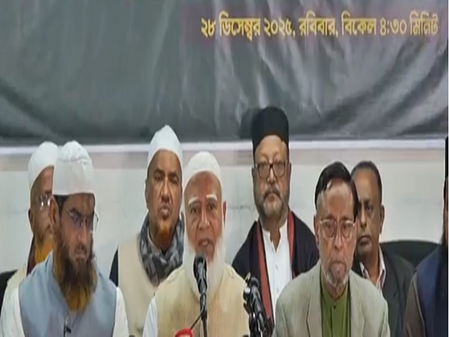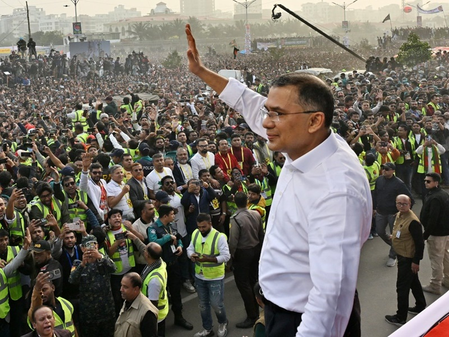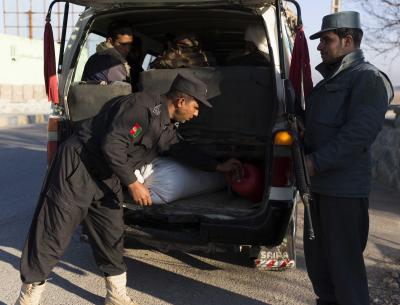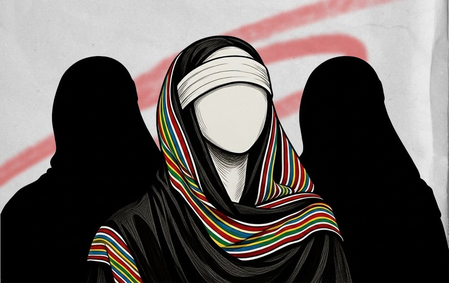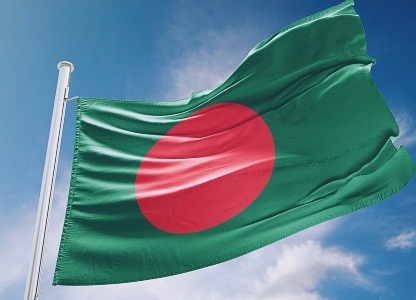
New Delhi, Nov 3 (IANS) The rising war of attrition between the Bangladesh Nationalist Party (BNP) and its one-time ally, Jamaat-e-Islami, is perceived as part of their respective leaders’ quest for absolute power in the absence of their common political enemy – ousted Prime Minister Sheikh Hasina and her Awami League (AL) party.
Bangladesh’s interim government, led by Muhammad Yunus, has pledged national elections in February next year.
Sheikh Hasina, in her cumulative period of premiership of some two decades, is alleged to have forced political opponents into submission.
Ironically, she and her party have now been kept out of the poll process by an administration run mainly by her critics. They characterise her reign with dictatorship, oligarchy and crimes against humanity, pointing out the imprisonment of former Prime Minister and BNP leader Khaleda Zia, among others.
Zia, jailed seven years ago, was serving a 17-year imprisonment in a graft case. Soon after Hasina’s exit, Bangladesh President Mohammed Shahabuddin had ordered her release last year. Now 80, she is unwell, mostly in hospital.
Major opposition parties had come together to challenge the might of Sheikh Hasina during her reign. The 78-year-old leader of AL is now living in exile in India.
In Bangladesh’s current political space, parties eye power on their own, without sharing it with former friends who had stood together only against a common foe.
Following last year’s July-August student uprising and the fall of the AL, the former allies now find themselves in a contentious position with each other. The BNP and the Jamaat decided to end the history of about 22 years of electoral partnership, when in 2022, the relationship started to estrange as the 20-party alliance against Hasina was dissolved.
Some reports argue that with the Jamaat consolidating its hold in Bangladesh’s electoral field, the BNP finds it a threat to the resurgence of the Zia-led party.
For the Jamaat, it is time to reestablish religious supremacy after a long time of facing a backlash over its radicalism. BNP leaders are said to be wary of the Jamaat’s rising influence since its ban was revoked last August by the interim government.
Under the AL, Jamaat was formally deregistered in 2013 and designated a terrorist organisation on August 1, 2024.
Of particular concern is the September performance of the Jamaat’s student wing, which swept the Dhaka University students’ union elections. It was the first such victory for an Islamist student group since Bangladesh’s independence 54 years ago.
Responding to the results, the BNP’s student organisation rejected it, calling the election “a farce”, allegedly carried out under “planned manipulation”.
Thus, the allegations and counter-allegations over the other’s nationalism and taking advantage of the interim government.
The two principal groups have been joined in political attrition by others, including organisations that registered themselves as political parties after last year’s student-led stir that led to the ouster of Hasina.
Several student leaders have alleged that the BNP and the Jamaat extracted benefits from the current administration while criticising youth advisors in the interim government.
Earlier this year, reports of a meeting between top functionaries of the BNP and the Jamaat in London leaked out, leading to speculations of an understanding between the two in the face of their shared doubts and criticisms of the Yunus-led administration.
Though details of the meeting were not known, respective leaders termed it a “courtesy call”.
However, media reports called it “unrealistic to rule out political discussions between the four top leaders of the two major parties”.
Some analysts termed the confabulation a result of the leaders’ doubts over the interim government’s functions and its intent in holding elections, while others viewed it as arising out of a possible resurgence of Haisna amidst political uncertainties. Through all the political manoeuvring, the neighbourhood – and the global community – warily watches the shifting sands in Bangladesh.
–IANS
jb/vd

